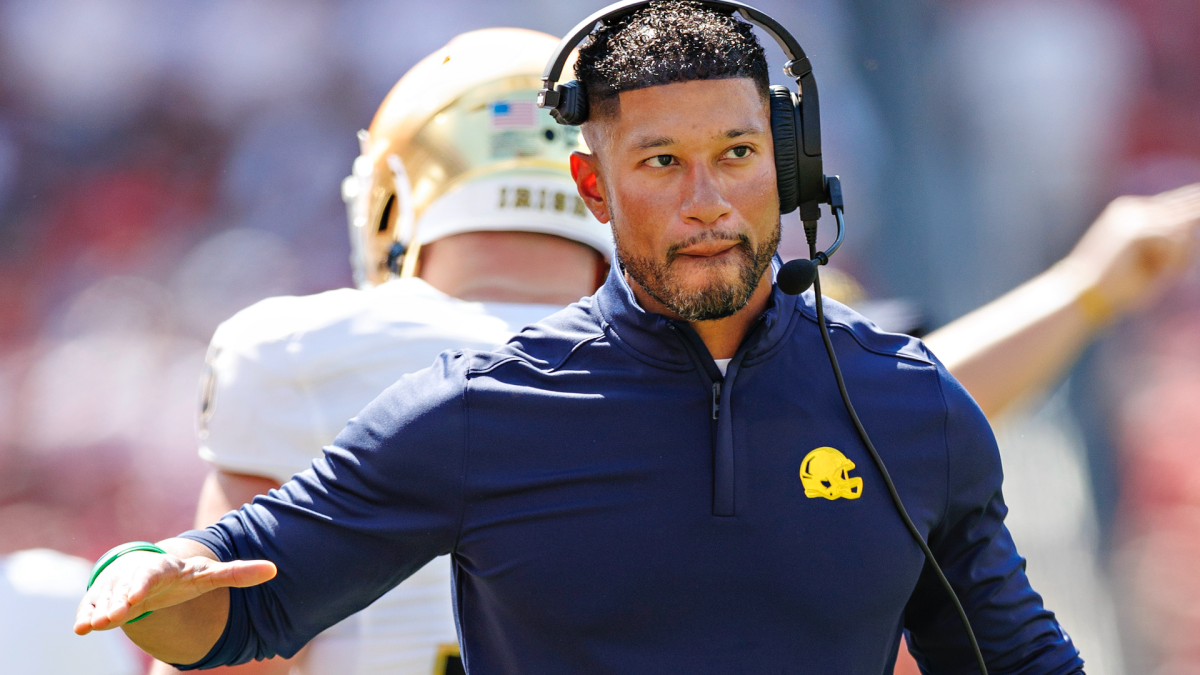Notre Dame football has long been celebrated as college football’s most iconic independent program, known for its unique position outside the traditional conference system. However, with the ever-evolving landscape of college athletics, questions have arisen about whether the Fighting Irish might eventually join a conference. Despite these ongoing discussions and speculation, Notre Dame’s head coach Marcus Freeman recently affirmed that there is no immediate plan to change their independent status, though he acknowledged that the future remains uncertain.
Currently ranked 12th in the nation with a 5-2 record, the Irish are taking a brief pause this week before resuming their season with a five-game winning streak. Their next challenge is an away game at Boston College on November 1. During a recent appearance on the podcast Bussin' With The Boys, Freeman addressed the topic of Notre Dame potentially joining a conference. He emphasized that while the future of college athletics is unpredictable—especially with private equity investments and shifting conference dynamics—Notre Dame’s administration and coaching staff remain confident in the advantages of remaining independent. Freeman stated that if the Irish “win the games we're supposed to win” and “take care of business,” they believe they have just as strong a chance to secure a spot in the College Football Playoff (CFP) as any other team.
Freeman’s comments reflect a consistent message he has echoed throughout the season, closely aligning with the views expressed by Notre Dame’s athletic director, Pete Bevacqua. Both Freeman and Bevacqua highlight the significant benefits that Notre Dame enjoys as an independent program. One of the key advantages is the flexibility in scheduling. Unlike teams bound by conference obligations, Notre Dame is not restricted to a fixed slate of opponents. Under their current agreement with the Atlantic Coast Conference (ACC), the Irish are required to play five ACC teams annually, but beyond that, they have considerable freedom to schedule matchups against a variety of opponents across the country.
This scheduling autonomy allows Notre Dame to strategically select games that balance competitiveness and favorable matchups. For example, this season’s schedule included marquee opponents such as Miami and Texas A&M, both nationally ranked programs, along with other games that offered a mix of challenge and opportunity. This approach serves Notre Dame’s goal of positioning itself as a strong playoff contender while maintaining a manageable path to victories.
Operating as an independent means Notre Dame is vying for one of the at-large bids to the College Football Playoff. The playoff field currently features an expanded 12-team format, which includes five automatic qualifiers—champions of the SEC, ACC, Big Ten, Big 12, and the Group of Six conferences—and seven at-large selections. Notre Dame competes for one of those at-large spots, and the expanded playoff format has been a significant boon for the program. Under the previous four-team system, Notre Dame faced challenges in securing a top-four seed because automatic spots were reserved for Power Five or Group of Five conference champions. With the new 12-team structure and a more comprehensive power rating system, the Irish have increased opportunities to earn a favorable seed based on performance and strength of schedule.
This season’s developments underscore Notre Dame’s potential under Freeman’s leadership. Despite losing their first two games to highly ranked opponents—Miami and Texas A&M—the Fighting Irish have rebounded impressively. They are now on the cusp of winning their next five games, which would result in a 10-game winning streak to close the season. Such a streak would be among the longest in the country, trailing only a handful of unbeaten teams like Texas A&M, Georgia Tech, and BYU. It’s worth noting that other undefeated teams, such as Ohio State and Indiana, are entrenched in conference play and will face additional challenges, including conference championship games, before the CFP selection committee makes its final decisions.
Notre Dame’s recent history in the playoff as an independent is notable. Since the inception of the College Football Playoff in 2014, the Irish have made three appearances without conference affiliation, including last year’s appearance as the No. 7 seed when they hosted 10th-seeded Indiana. This track record demonstrates that Notre Dame can remain relevant and competitive on the national stage while maintaining its independent status.
Pete Bevacqua has been particularly vocal about the benefits of Notre Dame’s independence in the current college football environment. Earlier this year, he described the program as being “in a very good spot” with respect to the playoff. He attributed much of this to the expansion of the CFP from

